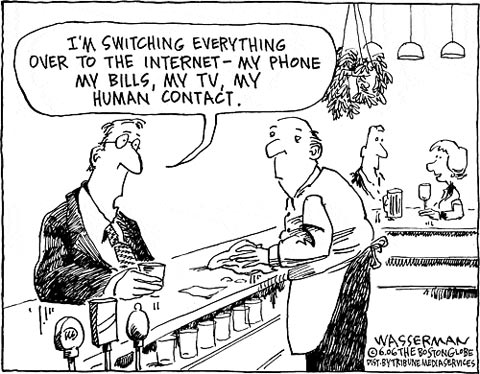
- Simplest answer anyone who wants to: can be any person, company or outlet, can blog about any topic. The variety can be seen in our serious they take the experience and what they want the end product to look like.
- Blogs Role in society: (within social institutions)
o Education Systems: use them not just as a tool, in classrooms, but as a communication level. They provide platforms for dialogues to exist; thus exchanging information among the masses but on an individual level.
o Business are using blogs more and more: seen in the ways they communicate with their public. Businesses are using new media as a way to talk to their consumers about their products. They are traditionally looking to promote their items but also to get feedback. This can be seen as a trend all over the world.
§ Ex: They could be aiming to corner the market on used books for example and so have blogs set up to have a forum for people to discuss
o New media markets, Mass Communications Field: have incorporated using blogs as a form of expressing, interpreting and reporting news. According to recent studies 95% of the top 100 newspapers have some form of a blog. With the shift from old to new media blogging is finding a home along side the reputable news sites. As outlets which promote creativity in an otherwise structured environments, audiences take to blogging. It is the same notion behind being able to learn more in a practicum situation verse a tutorial. Media, especially journalists, are reformatting the current market structure with this type outlet. They can discuss the news formally, in the old journalistic sense, or informally, in the more op-ed way. Here in Baltimore, there is a cousin-like paper to the Sun, B, which fuses the old media (newspapers) with new media (blogging).
- Journalist vs Bloggers: Journalism use of new media technology like blogging is growing everyday. The original differences arise out of the foundations of journalism's. For bloggers sources for posts can be linked to and immediately contacted. The research element for bloggers is much smaller, since in today’s circumstances finding resources are easier. The contact lists for sources are endless which in turn makes discusses richer. The topics are the final major difference among journalists and bloggers. Where journalists have to interpret the facts and regurgitate events, bloggers get to talk about the news on a more informal level and discuss their belief relative to the topic. However bloggers should attempt to remain as subjective as possible but still inject their own voice into posts. It is not so easy for every country however to make this transition from Journalist to blogger has some are catching backlash at home.
- People want to be thought of as individuals: Since blogs should follow one niche topic to reach a niche audience people can share their knowledge of a topic with others and create a more varied viewpoint on a subject which enriches our culture.
- Individual people (biggest contributors): They are building strong communities centered on a niche hobby, idea, belief, topic, etc. Typically the blogs are recreational in nature but that is not a requirement to ensure success. They can reach as far as the boundaries of the world will take them.
o I had a follower from the United Kingdom reading my blog. It is an amazing tool considering less then 100 years ago America had to watch the news at only certain times in the day and relied on newspapers for their information.
- Blogs give a voice to anybody willing to speak up: They are a provocative tool for accessing information about subject matter. They enhance and reform social networks by creating a platform for communications to exist. At the end of all the discussion, any person, company or outlet, can blog about any topic. However, certain criteria have to be met in order to ensure the blogs success.




No comments:
Post a Comment